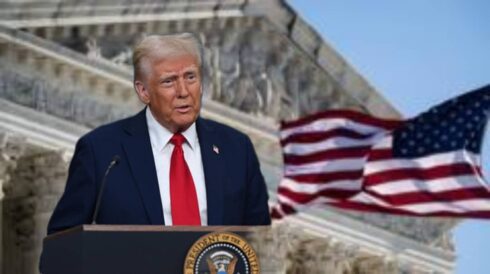President Donald Trump has officially designated English as the national language of the United States, signing a historic executive order at the White House on March 1, 2025. The decision marks the first time in U.S. history that English has been legally recognized as the country’s sole official language for federal government operations.
Speaking from the Oval Office, Trump called the move a “victory for American unity and patriotism.” He stated, “For too long, our country has catered to linguistic divisions. Today, we reaffirm that America speaks English, and it is the foundation of our national identity.” The executive order will impact federal agencies, government documents, and public services nationwide.
Donald Trump Eliminates Clinton-Era Language Access Mandates
Trump’s order also revokes Executive Order 13166, a 2000 policy implemented by President Bill Clinton that required federally funded agencies to provide services in multiple languages. Critics of Clinton’s policy argued it encouraged government inefficiency and slowed English assimilation among immigrants.
By removing these mandates, Trump aims to streamline government operations and encourage all residents to adopt English as their primary language. “America has welcomed people from around the world, but to succeed here, you must speak the language of the land,” Trump emphasized. His administration contends that this policy shift will reduce federal spending on translation services and increase national cohesion.
Trump’s Move Sparks Backlash from Minority Communities
Trump’s order has ignited fierce opposition, particularly among Hispanic advocacy groups and civil rights organizations. Activists argue that eliminating multilingual government services could disproportionately impact Spanish-speaking communities, who make up a significant portion of the U.S. population.
The American Civil Liberties Union (ACLU) condemned the move, stating that it would marginalize millions of non-English speakers. “This policy threatens access to essential services for vulnerable populations, from healthcare to voting rights,” said an ACLU spokesperson. However, Trump and his allies insist that the measure will encourage immigrants to integrate into American society more efficiently.
Trump Fulfills a Longstanding Conservative Goal
Trump’s executive order is a major victory for the English-only movement, a decades-old conservative push to establish English as the official U.S. language. Organizations like U.S. English and ProEnglish have lobbied for years to eliminate government-mandated multilingual services, arguing that they create unnecessary divisions and costs.
During his 2024 campaign, Trump repeatedly promised to “put America first” by reinforcing national identity and reducing reliance on government-provided translations. With this executive order, he has solidified his stance, fulfilling a promise that resonates deeply with his base.
Trump’s Critics Warn of Legal Challenges
Trump’s order is expected to face intense legal battles. Opponents argue that restricting government services to English could violate civil rights protections and discrimination laws. Some Democratic lawmakers have vowed to challenge the executive order in court, accusing Donald Trump of undermining diversity and inclusion.
“This is an attack on multicultural America,” said House Minority Leader Hakeem Jeffries. “We will fight this discriminatory policy every step of the way.” Legal experts anticipate lawsuits questioning whether the order infringes on constitutional rights, particularly regarding equal access to government services.
Donald Trump Stands Firm on National Identity
Despite the backlash, Donald Trump remains resolute. At a rally in Texas following the announcement, he declared, “We are bringing back the America we know and love—an America where English is our language, our culture is respected, and our people come first.” The crowd erupted in cheers as Trump doubled down on his commitment to prioritizing American values over political correctness.
With this executive order, Trump has cemented his legacy as a leader willing to challenge long-standing policies in the name of nationalism. Whether his decision will hold up against legal and political opposition remains to be seen, but one thing is clear—Donald Trump has once again reshaped the national conversation in his own image.














